Related Research Articles

Burhānuddīn Rabbānī was an Afghan politician and teacher who served as president of Afghanistan from 1992 to 1996, and again from November to December 2001.

Kabul is the capital city of Afghanistan. Located in the eastern half of the country, it is also a municipality, forming part of the Kabul Province. The city is divided for administration into 22 municipal districts. In 2023 its population was estimated to be 4.95 million people. In contemporary times, Kabul has served as Afghanistan's political, cultural and economical center. Rapid urbanisation has made it the country's primate city and the 75th-largest city in the world.

Nangarhār, also called Nangrahar or Ningrahar, is one of the 34 provinces of Afghanistan, located in the eastern part of the country and bordering Logar, Kabul, Laghman and Kunar provinces as well as having an international border with Pakistan. It is divided into 22 districts and has a population of about 1,735,531, the third highest of the country's 34 provinces. The city of Jalalabad is the capital of Nangarhar province. Nangarhar province is famous for its fish and karahi dishes.
Kabul University is one of the major and oldest institutions of higher education in Afghanistan. It is in the 3rd District of the capital Kabul, near the Ministry of Higher Education. It was founded in 1931 by King Mohammed Nadir Shah, whose prime minister at the time was his younger brother, Sardar Mohammad Hashim Khan.
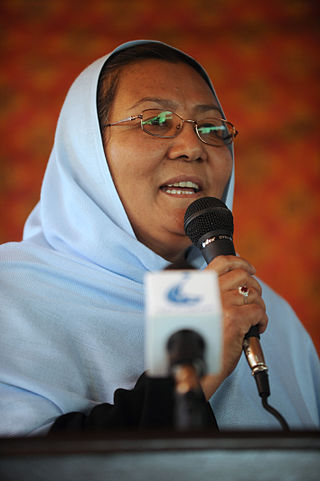
Dr. Habiba Sarābi is a hematologist, politician, and reformer of the reconstruction of Afghanistan after the Taliban first took power. In 2005, she was appointed as Governor of Bamyan Province - the first Afghan woman to become a provincial governor. She had served as Afghanistan's Minister of Women's Affairs and as Minister of Culture and Education. Sarabi was instrumental in promoting women's rights and representation and environmental issues. She belongs to the ethnic Hazara people of Afghanistan. Her last name is sometimes spelled Sarobi.

The 1989–1992 Afghan Civil War, also known as the FirstAfghan Civil War, took place between the Soviet withdrawal from Afghanistan and the end of the Soviet–Afghan War on 15 February 1989 until 27 April 1992, ending the day after the proclamation of the Peshawar Accords proclaiming a new interim Afghan government which was supposed to start serving on 28 April 1992.
Sher Zaman Taizi was Pashtun writer, poet, intellectual and journalist from Pakistan.
The following lists events that happened during 1963 in Afghanistan.
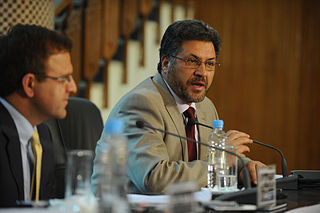
Ghulam Farooq Wardak is a politician in Afghanistan, formerly serving as the Minister of Education. He was appointed to that position by Afghan President Hamid Karzai on October 11, 2008.
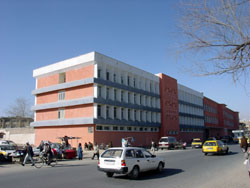
The Ministry of Finance of Afghanistan is responsible for the implementation and execution of the budget, collection of taxes, organization, and control of public expenses in Afghanistan; it also controls the management of the Custom Affairs. The Ministry of Finance provides a quarterly report to inform the public and the executive cabinet of advancements in Afghanistan's financial sector. The current Finance Minister is Nasir Akhund.
Pir Mohammad Karwan is a prominent and contemporary poet writing in the Pashto language.
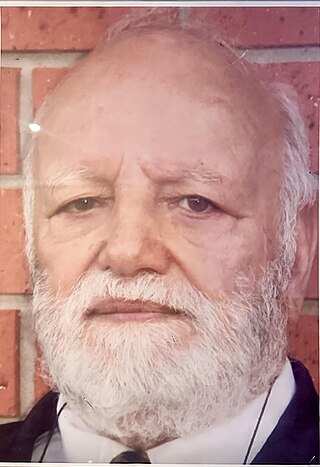
Abdul Rasul Amin was an Afghan politician, lexicographer, academic, writer, and former education minister.

Dr. Zabihullah Mojaddidy is an Afghan politician. He served as the Governor of Kabul Province between July 2009 and until resigning in March 2011. His resignation was due to a lack of support from development ministries and the Presidential Palace in regard to his ideas for the reconstruction of Kabul City. Prior to becoming governor, he served as the Deputy Minister of Higher Education.
Sanayee Development Organization (SDO) is an Afghan non-governmental organization headquartered in Kabul, Afghanistan. SDO's programs focus on community-based peace building, education, civil society development and community health in 12 provinces of Afghanistan.
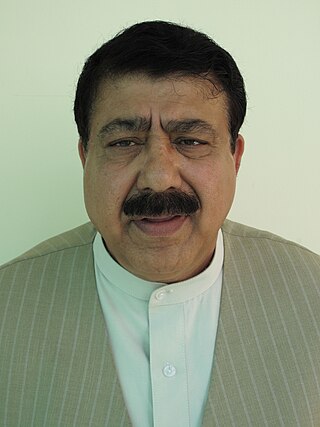
Dr. Syed Ghulam Farooq Mirranay was born in Nangarhar Province, Afghanistan in 1950. He is a senior member of the Afghan Social Democratic Party and was an elected member of the House of the People from 2005 to 2010. Mirranay is the official spokesperson for the Afghan Mellat Party and speaks both official Afghanistan languages, Pashto and Dari, as well as English.
2003 in Afghanistan. A list of notable incidents in Afghanistan during 2003
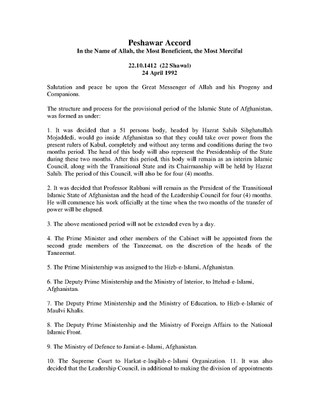
On 24 April 1992, the Peshawar Accord was announced by several but not all Afghan mujahideen parties: Gulbuddin Hekmatyar, leader of Hezb-e Islami, had since March 1992 opposed these attempts at a coalition government.
Mahmoud Saikal is a senior Afghan diplomat and an international development specialist. He was the Permanent Representative of the Islamic Republic of Afghanistan to the United Nations from October 2015 until February 2019.
Nargis Nehan is an Afghan former politician who served as the acting Minister of Mines, Petroleum and Industries.
Mohammad Moeen Marastial is an Afghan politician who served as a Member of Parliament in Wolesi Jirga, the lower house, representing the people of Afghanistan from 2003 to 2009. During his incumbency, he advocated for education for all, a receptive and accountable government, focusing on the best interests of the nation and a strong rule of law.
References
- ↑ Sanayee Development Organization
- ↑ "Home | Sanayee Development Organization (SDO)". www.sanayee.org.af.
- 1 2 "Sanayee Development Organization (SDO)". Peace Insight.
- 1 2 "El-Hibri Foundation". www.elhibrifoundation.org.
- ↑ "El-Hibri Foundation Peace Education". elhibrifoundation.org. Archived from the original on 2015-02-02.
- ↑ "Database". afghan-bios.info.
- ↑ "Afghanistan - Homeless World Cup". Archived from the original on 2015-09-25. Retrieved 2015-09-23.
- ↑ "Chikyu Kids Environmental Network [Kabul English Language Center]". www.chikyu-kids.net.
- ↑ "Ethnic factor in peace-building and reconstruction". peace.pajhwok.com.
- ↑ http://www.afghandata.org:8080/xmlui/bitstream/handle/azu/4200/azu_acku_pamphlet_la1081_m55_1990_w.pdf?sequence=1&isAllowed=y [ bare URL PDF ]
- ↑ "Database". afghan-bios.info.[ permanent dead link ]
- ↑ Bare Foot Afghan movie trailer فلم پابرهنه. YouTube. 23 August 2011.
- ↑ Peace is Life part 01 Afghan feature film by SDO. YouTube. 25 April 2011.
- ↑ "Deow Wa Pari part 01 Afghan feature film by SDO - YouTube". www.youtube.com.